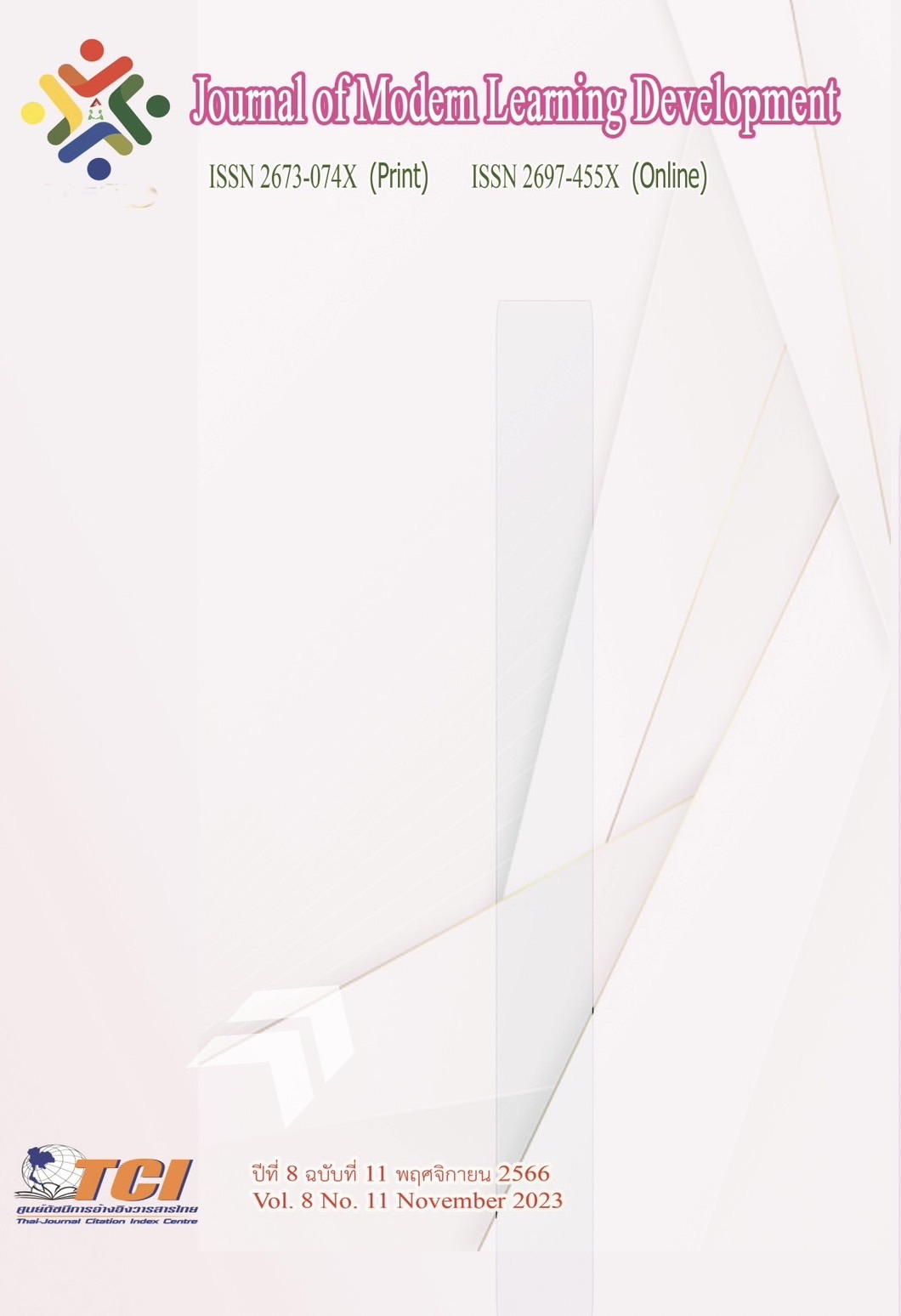The Effect of Play-Based Instruction on Young Learners’ English Vocabulary Learning: A Case Study of Primary School Students in Guangxi Zhuang Autonomous Region
Main Article Content
Abstract
The objectives of this research were: (1) To compare the effects of play-based instruction and rote instruction on pupils’ English vocabulary learning in classroom setting. (2) To examine the levels of pupils’ positive engagement during play-based instruction classes. This research involved 22 pupils studying in Grade 4 divided into a control group and an experimental group. The research instruments employed in this research were play-based instruction, pretest, post-test, and an observation checklist. The data of pretest and post-test were analyzed by independent samples t-test, paired samples test, mean (M), and standard deviation (SD). Pupils’ sum and frequency, whose data originated from the observation checklist were measured pupils’ positive engagement, negative engagement, and non-engagement levels.
The results were: (1) Play-based instruction was more effective than rote instruction on learning vocabulary. (2) In play-based instruction, the level of pupils’ positive engagement was high.
Article Details
References
Bakhsh, S. A. (2016). Using games as a tool in teaching vocabulary to young learners. English Language Teaching, 9 (7), 120-128. https://doi.org/10.5539/elt.v9n7p120
Carini, R. M., Kuh, G. D., & Klein, S. P. (2006). Student engagement and student learning: Testing the linkages. Research in Higher Education, 47, 1-32. https://doi.org/10.1007/ s11162-005-8150-9
Derakhshan, A., & Khatir, E. D. (2015). The effects of using games on English vocabulary learning. Journal of Applied Linguistics and Language Research, 2(3), 39-47.
Ding, X. X. (2020). On the practice of learning English vocabulary through play. Reference for Elementary Teaching, 24, 1.
Dolati, R., & Mikaili, P. (2011). Effects of instructional games on facilitating students’ vocabulary learning. Australian Journal of Basic and Applied Sciences, 5(11), 1218-1224.
Dyussenova, A., & Wang, X. Q. (2020). Useful primary and secondary school English teaching games. Shanghai Educational Publishing House
Fredricks, J. A., Blumenfeld, P. C., & Paris, A. H. (2004). School engagement: Potential of the concept, state of the evidence. Review of Education Research, 74(1), 59-109. https://doi.org/10.3102/00346543074001059
Horn, R. A. Kincheloe, J. L. (2006). The Praeger handbook of education and psychology [4 Volumes]. (1st ed.). USA: Praeger.
Huyen, N. T. T., & Nga, K. T. T. (2003). Learning vocabulary through games. Asian EFL Journal, 5(4), 90-105.
Jia, J. H., & Sui, X. B. (2021). Problems and countermeasures of English game teaching in rural primary schools. Educational Research, 4(1), 95-96.
Jiang, C. L. (2017). Carry out the accumulation and learning activities of extracurricular English vocabulary in primary schools to promote students’ vocabulary learning. English Pictorial (Senior), 25, 41.
Lillard, A. (2008). How important are the Montessori materials? Montessori Life, 20 (4), 20-25.
Liu, F. (2018). Learning while playing, playing while learning, on the application of game teaching method in primary school English teaching. Xinkecheng (TipDm-Res), 6, 67.
Montessori, M. (1965). Dr. Montessori’s own handbook. New York: Capricorn Books.
Nguyen, T. T. H., & Khuat, T. T. N. (2003). The effectiveness of learning vocabulary through games. Online. Retrieved May 22, 2023. from http://asian-efl-journal.com/dec_03_vn.pdf
Nilsson, M., & Ferholt, B. (2014). Vygotsky’s theories of play, imagination, and creativity in current practice: Gunilla Lindqvist’s “creative pedagogy of play” in U. S. kindergartens and Swedish Reggio-Emilia inspired preschools. Perspectiva, 32(3), 919. https://doi.org/10.5007/2175-795X.2014v32n3p919
Pho, A., & Dinscore, A. (2015). Game-based learning (pp. 1-5). Tips and trends.
Piaget, J. (1962). Play, dreams, and imitation in childhood. New York: Norton
Pyle, A., & Danniels, E. (2017). A continuum of play-based learning:The role of the teacher in play-based pedagogy and the fear of hijacking play. Early Education and Development, 28(3), 274-289. https://doi.org/10.1080/10409289.2016.1220771
Rawi, S. H. A. M., & Zain, M. H. K. M. (2021). Gamiapp: Using games in WhatsApp to increase pupils’ engagement in PDPR. In Carnival of Research and Innovation (CRI 2021) in Conjunction with International Virtual Innovation & Invention Challenge (Intelligent 2021) & Creative Innovation Carnival (CIC 2021) (pp. 328-329). University Malaysia Kelantan.
Romano, E. L., Babchishin, L., Pangani, L. L. & Kohen, D. (2010). School readiness and later achievement: Replication and extension using a nationwide Canadian survey. Developmental Psychology 56(5): 995-1007. https://doi.org/10.1037/a0018880
Uberman, A. (1998). The use of games for vocabulary presentation and revision. English Teaching Forum, 36(1), 20-27.
Wu, Q. R. (2021). How to stimulate students’ engagement in English classroom in primary schools. English on Campus, 2021(28), 178-179.
Yan, H. (2014). “Apples to apples” to foreign language learning: The comparison of play and non-play intervention at a Chinese elementary school. Online. Retrieved March 12, 2021. from http://hdl.handle.net/10211.3/121616
Yu, Q. P. (2017). A comparative study on the influence of traditional teaching mode and game teacher mode on English vocabulary learning in primary school. Modern Primary and Secondary Education, 33(2), 7.
Yunianti, S. S. (2020). Play-based learning as an essential strategy to face 21st-century learning. In ICLLT 2019: Proceedings of the 1st International Conference on Language and Language Teaching (p. 67). European Alliance for Innovation.
Vygotsky L. S. (1967). Play and its role in the mental development of the child.
Sov. Psychol, 5, 6–18. https://doi.org/10.2753/RPO1061-040505036
Zosh, J. M., Hopkins, E. J., Jensen, H., Liu, C., Neale, D., Hirsh-Pasek, K., . . . Whitebread, D. (2017). Learning through play: A review of the evidence (white paper). The LEGO Foundation.
Zosh, J. M., Hirsh-Pasek, K., Hopkins, E. J., Jensen, H., Liu, C., Neale, D., . . . Whitebread, D. (2018). Accessing the inaccessible: Redefining play as a spectrum. Frontiers in Psychology, 9, 1124. https://doi.org/10.3389/fpsyg.2018.01124
Zuckerman, J. T. (2007). Classroom management in secondary schools: A study of student teachers’ successful strategies. American Secondary Education, 35(2), 4-16.


